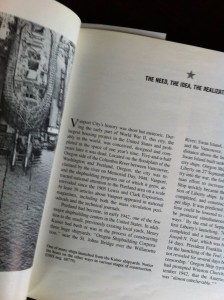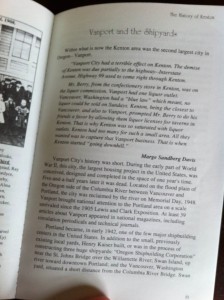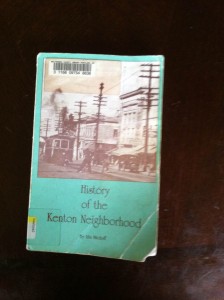Plagiarism is one of the worst things that a writer can be accused of doing. This is not simply because it is an act of theft (though it is precisely that) but also because it reveals a certain intellectual bankruptcy on the part of the offender. A plagiarist does not interpret, analyze, or even bring new personality to what they’re purportedly writing about. They do not provide a unique voice, interpretation, or perspective. They do not, to borrow a pop business term, add value.
Earlier this week I found out that a local author copied another, earlier book. I was at the Multnomah County Library looking at secondary sources for an upcoming feature on Vanport, and I cracked open this book for obvious reasons:
 Because Vanport was in North Portland, I figured that some of the regional neighborhood publications could also be handy. Maybe there were stories or citations in those that would provide interesting details or dramatic first-person accounts, or just a different spin or viewpoint that would be worth looking at. I grabbed a few of them, including this one:
Because Vanport was in North Portland, I figured that some of the regional neighborhood publications could also be handy. Maybe there were stories or citations in those that would provide interesting details or dramatic first-person accounts, or just a different spin or viewpoint that would be worth looking at. I grabbed a few of them, including this one:
History of the Kenton Neighborhood did indeed have a chapter on Vanport. However, the text felt a tad familiar. Here’s the opening paragraph from Manly Maben’s book (click it to enlarge):

And here’s the Vanport section from the book on Kenton:
History of the Kenton Neighborhood, published in the late 1990s, copied from Manly Maben’s Vanport, which preceded it by about a decade. I read the section a few times and found that pretty much all of it was just lifted from the other book. I was shocked to see something so blatant, shameless, and obvious.
I didn’t know what to do. I thought, for a ridiculous moment, that I should go up to a librarian and say “pardon me, but this book in your Portland history section contains plagiarism,” however I doubt that would yield any kind of results. It’s not like I can go to the Writing Police and report author Alta Mitchoff as a plagiarist. I can’t take away her writing license.
I can do this, though. Alta Mitchoff, if you happen to be reading this (for some reason), I want to address you directly.
You are not a writer. You are not a historian. You are not a journalist, a chronicler, an interpreter of history, or a steward of culture. You took someone else’s work and copy-pasted it into your own crappy little neighborhood history book, and put your name on the cover. You’re a thief, Alta Mitchoff, and I caught you.

